Gary Clark Jr.: The Triumph of the Riff
“No other people in the land have as yet evolved a characteristic idiom that relects a more open, robust, and affirmative dispostion toward diversity and change. Nor is any other idiom more smoothly geared to open-minded improvisation. The blues tradition, a tradition of confrontation and improvisation … is indigenous to the United States along with the Yankee tradition and that of the backwoodsman.”
— Albert Murray, The Omni-Americans
We don’t want, we don’t want your kind
We think you’s a dog born
Fuck you, I’m America’s son
This is where I come from
This land is mine
This land is mine
— Gary Clark Jr., “This Land”
Blues may come and blues may go, but they color every facet of American culture in ways we hardly recognize. Ironically, it’s easy to lose sight of that in Memphis, where the blues in their most traditional forms rule the night, often viewed by experimentalists and punks as part and parcel of a mainstream culture they’re trying to escape. Here, and in other hubs like Chicago and Kansas City, where the blues is “a thing,” the celebration of the blues in their most distilled expression can obscure the fact that they color all of America’s identity, even the avant garde. For Albert Murray, the music is the ultimate expression of African Americans’ contribution to the national character. Black Americans, in his eyes, are the Omni-Americans, the template for all of us, due in part the blues’ celebration of diversity in the face of dislocation and disenfranchisement.
While hipper musicians are often disdainful of Murray’s traditionalist musical tastes, one can readily see his larger point. For the blues, built on the marriage of riff, rhythm, and rhyme, have informed every aspect of our popular culture. And as American pop culture has overtaken the world, so too have the principles of the blues. Which is only a more long-winded way of saying what the ever-insightful Jim Dickinson distilled into a catchphrase, glib but true: “World boogie is coming”™.
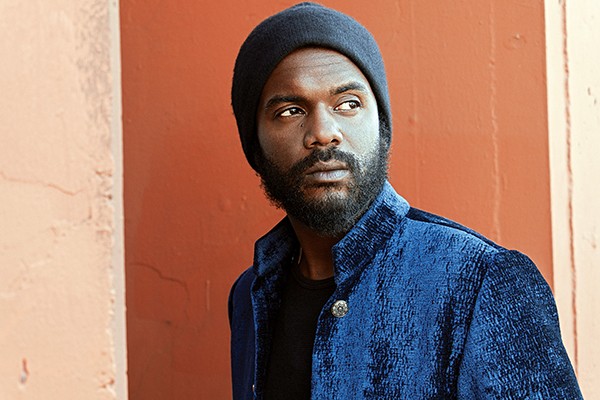 Frank Maddocks
Frank Maddocks
Gary Clark Jr.
Perhaps no contemporary artist captures the ongoing power and relevance of the blues as well as Gary Clark Jr. Rising from the multicultural hotbed of Austin, he’s taken a deep understanding of actual blues riffs into new territory, freely cross-referencing hip-hop, funk, soul, and rock in his all-consuming appetite for innovation. Clark’s genius is to weave the diversity of our sound-bite universe seamlessly into a coherent vision, using the versatility of the blues.
He’ll be one of the headliners helping to close out the embarassment of riches that is the annual Beale Street Music Festival. With so much star power of such diversity converging here over three days, the real challenge will be choosing who to see at any given time. To keep the inspiration flowing, you might challenge yourself to find common threads between such eclectic talents as Cardi B, the Killers, BlocBoy JB, the Claypool Lennon Delirium, and others.
One such thread, I would argue, is the blues. It will be most obvious at the Coca-Cola Blues Tent, which will feature such masters as Bettye LaVette and William Bell, not to mention Memphis’ own Barbara Blue backed by the legendary Bernard Purdy on drums. Beyond that, you’ll find endless variations on riff, rhythm, and rhyme. And Clark’s Sunday appearance on the Bud Light Stage might just provide the perfect capstone to the weekend, tying it all together.
Clark isn’t working in a vacuum, of course. As trends have come and gone in American music, the blues, and its more cosmopolitan cousin, soul music, have been a constant and steadily growing presence. If the blues meta-template has subliminally steered nearly all American music (even in hip-hop, where the riffs are often samples of others’ riffs, radically recontextualized), music wearing the blues influence on its sleeve never went away. Our city’s International Blues Challenge and Blues Music Awards are only samples of a globally expanding interest in the genre. The North Mississippi Allstars have, for example, worked stages around the world for more than 20 years, pairing traditional blues with a thirst for other forms such as jam rock, folk, hip-hop and even EDM. They’re often to be seen at the Beale Street Music Festival, although this year we’ll have to wait until they open up the summer’s Orion Free Music Concert Series at Levitt Shell on May 31st.
They’re kindred spirits to Clark, both in the diversity of their influences and the way their fan-base cuts across traditional boundaries. If Luther and Cody Dickinson have always brought a little of their father’s punk energy to everything they do, so, too, does Gary Clark Jr. Though Jim Dickinson railed against modern day Beale Street as a “four-block theme park devoid of soul,” he never lost sight of the power of the blues to channel one’s rage against the status quo, most recently summed up by Clark: “Fuck you, I’m America’s son.”
It’s a sentiment for our times, a strident affirmation of belonging in the face of bigotry. In the song “This Land,” inspired by a real-life encounter with a white man who refused to believe Clark owned his own land, his literal ownership of property becomes the claim he stakes on this nation as a whole. And in Clark’s case, the statement is made in the context of the olive branch he holds out to stereotypically white forms. His heavier-than-molten-steel take on Lennon and McCartney’s “Come Together” is sure to please any Guns ‘n Roses fan, and elsewhere he carries the torch of Jimi Hendrix into this century with panache.
Turning on a dime, he can also evoke earthy pre-war blues with tunes like “The Governor.” Or deftly channel the sweet sounds of soul, evoking Curtis Mayfield or Prince with his expressive falsetto. It’s all part of this virtuoso’s take on nothing less than the whole of American music. As synthesizers mesh freely with bottleneck guitar, he’s refreshing our view of the past and charting a course for our future.
— Alex Greene
St. Paul & the Broken Bones: Working on a Process
When you talk about Southern values, family certainly ranks as a significant cornerstone. For Paul Janeway, lead singer of St. Paul & the Broken Bones, it was inspiration for the collection of songs that make up Young Sick Camellia, the third studio offering from the Alabama octet.
Not unlike the two albums that preceded it, 2014’s Half the City and the 2016 follow-up Sea of Noise, Camellia is a gritty batch of gut-bucket soul framed by on-point horn arrangements and driven by Janeway’s vocal phrasing that bounces between a biting falsetto and yearning croon. Janeway, who hails from the rural Alabama burg of Chelsea, started the project by decided he wanted to record a trio of EPs inspired by the relationship between his grandfather, dad, and himself.
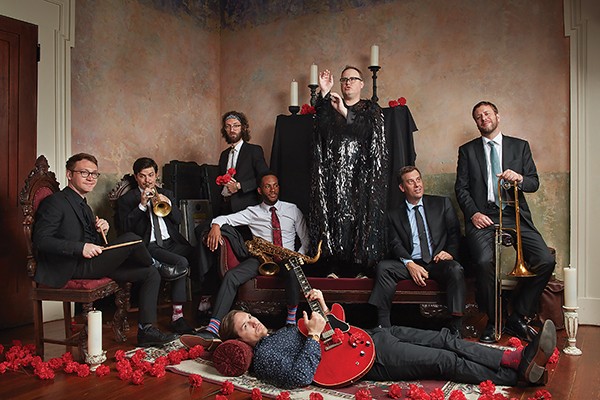 McNair Evans
McNair Evans
St. Paul & the Broken Bones
“I think when we got done with record two, I kind of knew where I wanted to go almost immediately. Once I’m done with a record, I want to know where I’m going next and it’s kind of what I did with this,” Janeway explained in a recent phone interview. “For me, initially, it was to make three EPs. It was going to be through my eyes, my father’s eyes, and my grandfather’s eyes. I had a desire to do it because they are complicated relationships, which I kind of think a lot of people can relate to. It doesn’t have to be a father, but family in general. For me, I wanted to kind of work through that. This is kind of part one and I just had this desire to do it through my kind of lens. It became a bigger project than I thought.”
When it came time to tackle this considerable undertaking, Janeway and his bass-playing collaborator, Jesse Phillips, were in the middle of trying to find a producer who would help facilitate their creative vision. Columbia Records CEO/chairman Ron Perry suggested the duo meet with Jack Splash, best known for working with hip-hop/R&B artists like Kendrick Lamar, Goodie Mob, and Alicia Keys. It didn’t take long to find plenty of common creative ground.
“On the musical end, it was one of those things where we worked with Jack Splash, a producer that was ‘out of our realm.’ That was musically important because it changed things for us. For him, he was just enthusiastic about the project. For us, it felt right and we just kind of led with our guts. If it feels right, then it probably is right on the creative and artistic side,” Janeway explained. “It was kind of like a blind date in a lot of ways, when you do these kinds of things. We had our publishing company and the record company tell us to talk to this guy to see if we liked him, and we really liked him and kind of hit it off almost initially. We said it was an open canvas, that we needed to figure out what to do. Working with him, he’s an overly positive guy. He extracts the best effort out of everybody, which is really what a producer should do.”
Having grown up as a preacher’s kid, Janeway brings the kind of performative fervor as equally to the studio as he does to the stage, not unlike musical forbearers/influences like Sam Cooke and Al Green did a generation before. Highlights include “Apollo,” a delectable mash-up of Hammond organ, funky synth squiggles and a dash of ambient psychedelia punctuated by lyrics like “Lookin’ down from my orbit/Captain, can you get her to call me?” Elsewhere, cuts like the stop-and-stutter “Convex” and the string-kissed “GotItBad” pump up the grooves in a way that anyone who’s ever been sucked in by the late Sharon Jones or Charles Bradley will immediately gravitate to and embrace. Equally entrancing is the dreamy soul of “Concave.”
Adding to the esoteric vibe infusing this collection of songs are snippets of dialogue from conversations Janeway recorded with his late grandfather that are interspersed throughout the album. Camellia closes with “Bruised Fruit,” a ballad that finds Janeway dialing down and delivering a performance that builds off the slightest bit of orchestration, mournful horn charts and sparse piano accompaniment that frames couplets like “You did nothing right/you did nothing wrong/But no one seems to recall the love that you gave/The love that you forsake.” It all comes off as equal parts substantial, dark, and life-affirming.
While Janeway and Phillips had been the main ones to steer St. Paul and the Broken Bones, the decision to rope the remaining members into the creative process for the current record proved to be a successful and rewarding one.
“I think our approach this time around was just kind of open and we went many different ways. There are songs on this record that the trombone player wrote. And some of the songs were written with me, Jack, and Jesse,” he said. “We had a drop box, and anyone who had any sort of musical idea could put it in and I could choose what I was feeling. ‘Apollo’ was written in the studio, with all eight of us in the room. Honestly, it was the best because we learned over time that there are many ways up a mountain. Obviously, if you’re afforded the time, that was what was really great about it. Honestly, this is the most prepared we’ve ever been for a record, and that’s a good feeling.”
Having spent a significant time performing live, including a memorable stint opening for the Rolling Stones, St. Paul & the Broken Bones are a road-tested bunch eager to expose fans to their latest evolutionary direction.
“[We’re going to do] mostly new stuff,” Janeway said. “We’re getting to the point where we’re singing some of these songs for six years and it starts wearing thin. You don’t want to mess up what got you to the dance obviously, but you want to change a little bit. I think every record, you should have a different show. Even what I wear is different. We recently did a test run and went to Texas and we were doing the new show. I think the energy of the crowd and audience has never been better, and that’s a good sign because you don’t know [how it’s going to be] until you do it.” — Dave Gil de Rubio
Southern Avenue: Threads of Blues and Soul
Of all the threads of blues and soul woven through this year’s Beale Street Music Festival, few have been more inspiring than Memphis’ own Southern Avenue. From the beginning, they’ve struck many as marking a watershed moment, not only for their youthful enthusiasm for older forms, but as a flagship act for the briefly revitalized Stax label. Since their first gig in September of 2015, they’ve gone from success to success, to the point where an appearance at Memphis in May’s musical extravaganza is the norm, not the exception.
While their early days were marked by a search for their true identity, the past year has seen the solidification of both the band’s sonic stamp and its personnel, now consisting of Tierinii Jackson (lead vocals) Ori Naftaly (guitar), Jeremy Powell (keyboards), Tikyra Jackson (drums, vocals), and Gage Markey (bass). I recently spoke with Naftaly, who also writes much of the band’s material, about the changes they’ve seen in the past two years and where he thinks it’s all headed.
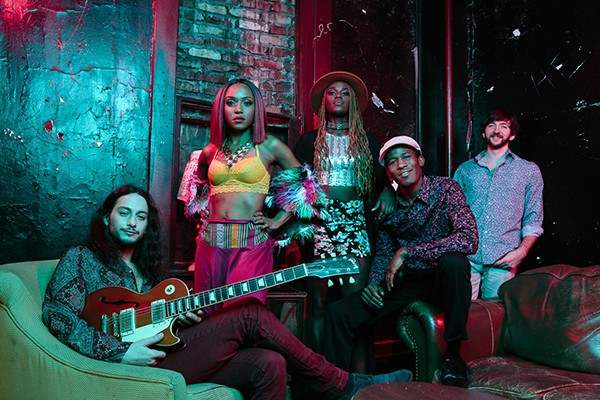 David McClister
David McClister
Southern Avenue
Memphis Flyer: It seems like Southern Avenue is touring a lot these days. What have been some of the highlights?
Ori Naftaly: In the past year or two, we’ve had so many amazing moments. With the North Mississippi Allstars, with JJ Grey, and the Revivalists. Galactic. Marcus King. For me, the Lockn’ Festival was definitely a huge moment, being able to play next to all of these people. There was a huge crowd, and then the other bands: Tedeschi Trucks Band, George Clinton and P-Funk, George Porter Jr. and Zigaboo Modeliste with the Foundation of Funk. So, playing the show itself, and then the green room experience. Shaking Bob Weir’s hand, talking to Tedeschi and Trucks. And Tierinii and me meeting John Mayer. That whole day was unique. And then we couldn’t stay. I hear four songs by the Dead and we had to leave for the next show. So we never felt like we really concluded the night, the day, the experience. We left with our jaws open. Lockn’ was huge, for sure, for all of us.
What’s on the horizon for you, as far as touring?
ON: Just a week ago, Tedeschi Trucks announced that we would support them on their tour in November. They were checking out a lot of bands, and we were really biting our nails until we found out that we were the ones. They take it very very seriously. I think what made it all happen was that Lockn’ show, where I got to talk to Derek for 20 minutes. A Tedeschi Trucks support tour is huge for us. I’ve been a fan since I was a kid. I’ve seen them all my life, and I’ve been playing since I was 5. Like us, Susan Tedeschi did the International Blues Challenge, years and years ago.
You’re about to release a new album, Keep On, on Concord. How has your sound evolved since the first record?
Fans have known many of the new songs for a while. Especially “Whiskey Love” and “Lucky.” Those two songs have been with us for a year now. We wrote on tour, we wrote in the van. We recorded songs on our days off. And we ended up not seeing our family like Tierinii’s kids and Jeremy’s daughter for two extra weeks. It was a lot of stress. A lot of blood, sweat, and tears went into this record.
With the first one, we were stirring the pot of what Southern Avenue is, and with this one we’re more grounded. It’s an evolution. I remember the first record: Half of it was recorded by me and Kevin [Houston] in a studio in East Memphis, with zero budget. It was done very independently — we’re talking about a very primal version of Southern Avenue. I couldn’t afford overdubs for solos. With the new record, we had time on a lot of them to plan and have a vision. “Keep On” is a song where we wanted to have this Isaac Hayes vibe. A retro soul sound. And then “Whiskey Love” is a perfect Southern Avenue kind of jam. Throughout the album, I wanted to bring in new elements, but I wanted them to be vintage, not new. So I brought a Mellotron [a tape-based proto-sampler from the 1960s] and used it on specific songs. And it’s not a plug in, it’s a real Mellotron being played. I think the Mellotron, mixed with the already heavy vocals and background vocals and horns, having all that together, it really gives this album a lot of air, a lot of breathing. You can hear a lot of space.
How was it working with William Bell on “We’ve Got the Music”?
That was so much fun. That dude is very in the know and very sharp. He still knows every corner in town. He’s very very hip. We had a great time writing together. I had a vision for the song, and he was really into it and kept taking the concept further and further, deeper and deeper into the essence of “we’re all the same, and what connects us is music.” And when everything brings you down and life is hard, it’s okay, you got the music. He loved it, and he was like, ‘Okay, let’s do this.’ I brought the bass line, and then Tikyra Jackson contributed a lot. It make us feel like we’re doing something right.
Working with him must have felt like a culmination of your being on Stax for the first album.
Being on Stax, we felt like we found a hole in the matrix, and we managed to squeeze in just in time. Because they’re not doing new releases any more that I know of. I don’t know why. Even more, we feel like we were really able to stretch the matrix and find a spot in their catalog. I think the first one is so Staxxy. That album was as Memphis as anything gets.
The new one will be on Concord. And that’s good. I’m happy about that. The Stax thing was amazing, but it was also limiting in the way it affected people’s perceptions and expectations. And we just wanna be a band. We will always be Stax, but even at Stax, the sound was always changing, you know? Now we can just be who we are. — Alex Greene
Southern Avenue is hosting a signing and album listening party at the Stax Museum of American Soul Music on Sunday, May 5, at 2:00 PM.
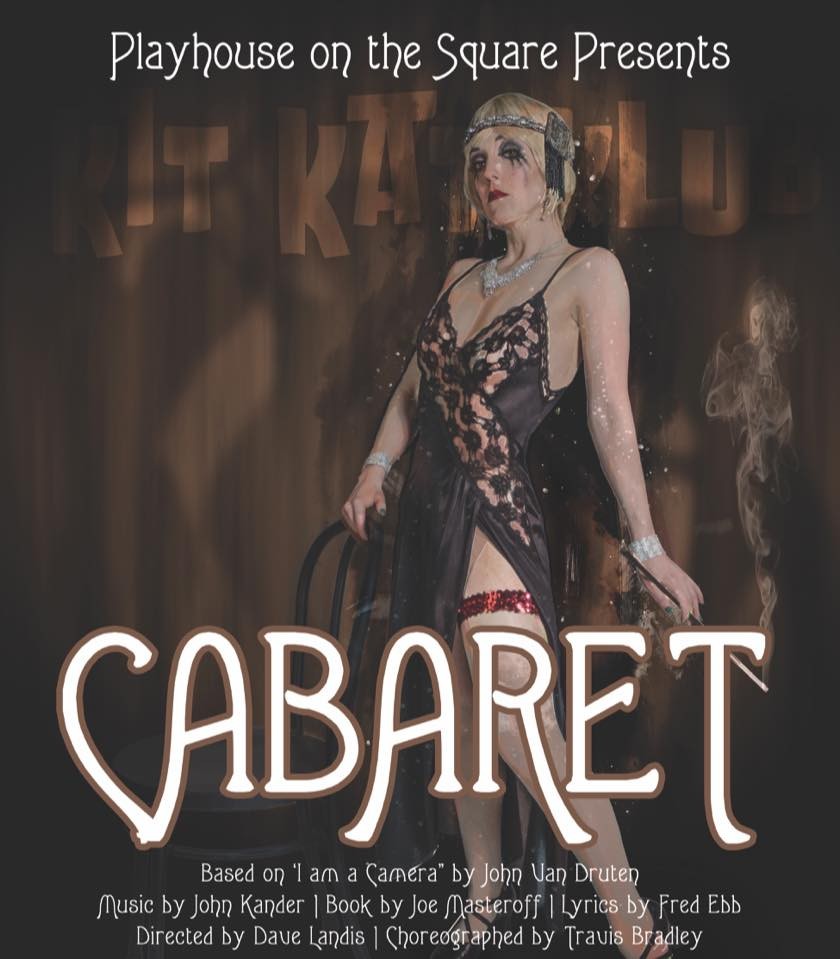
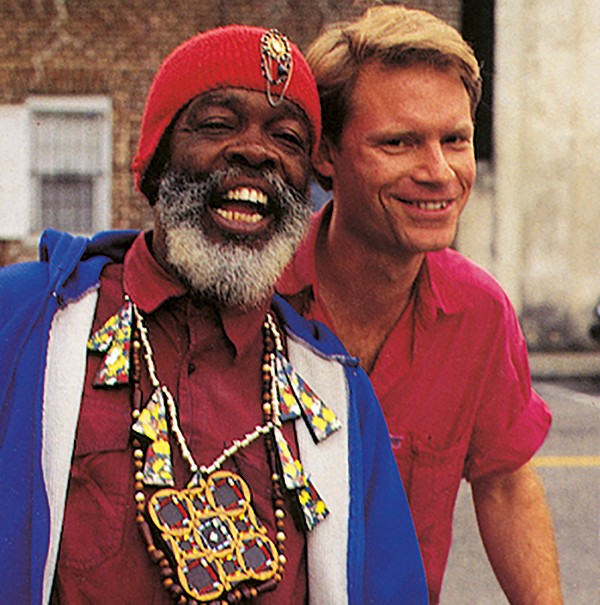 “Satan & Adam,” Facebook
“Satan & Adam,” Facebook 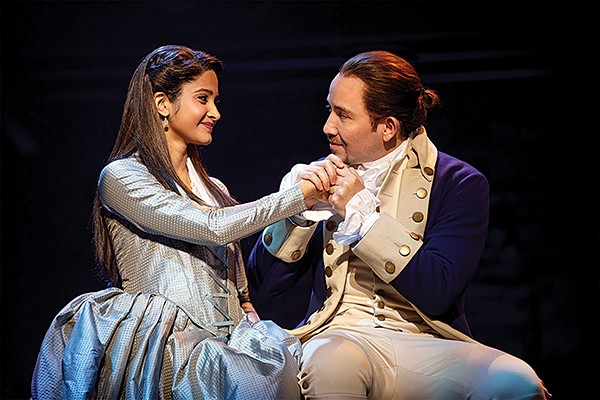 Courtesy of the Orpheum
Courtesy of the Orpheum 
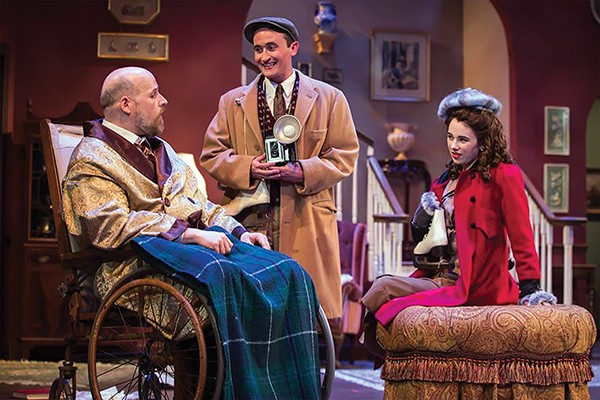

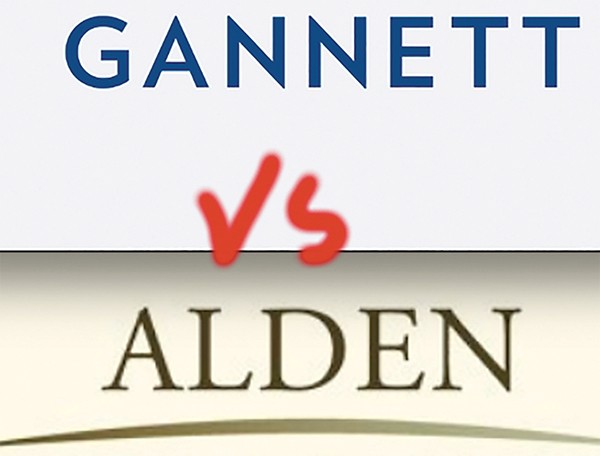
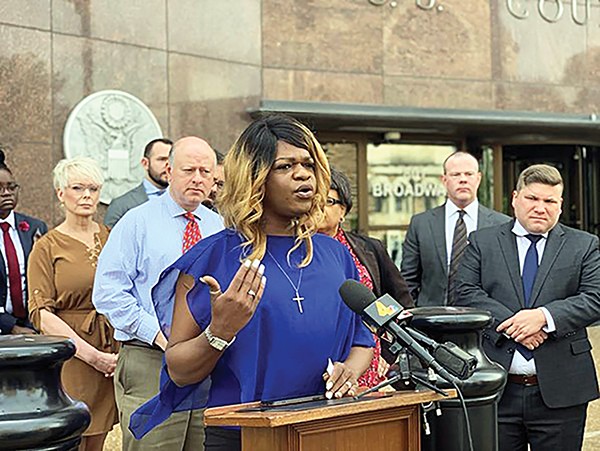 Lambda Legal
Lambda Legal  Frank Maddocks
Frank Maddocks  McNair Evans
McNair Evans  David McClister
David McClister 